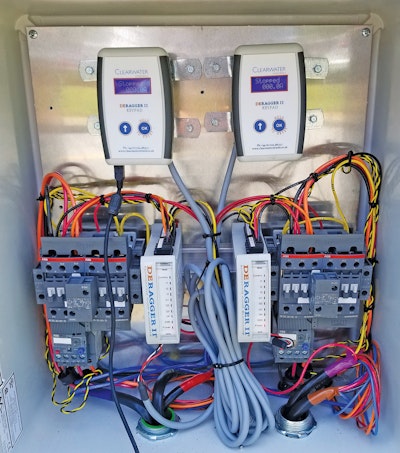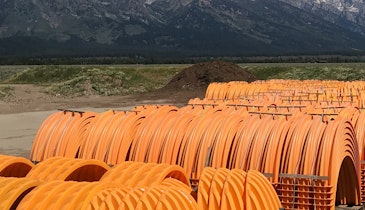
The DERAGGER+ module uses sophisticated sensing to monitor a pump’s power signature and detect when a wipe or other object has caught on the impeller
Among the problems created by the proliferation of wipes is the unpleasant, time-consuming and costly job of periodically pulling rags from pumps.
Many utilities have tackled the problem by installing choppers or grinders that macerate the wipes into particles that pumps can easily pass. Now United Kingdom-based Clearwater Controls (doing business as DERAGGER in the U.S.) offers a technology that instead uses intelligent pump control to allow wipes to pass without cutting.
The DERAGGER+ anti-ragging device monitors the pump’s power signature and detects when a wipe is interfering with the pump’s operation. At that point, it runs the pump through a reverse cycle that releases the wipe, which then passes through when normal operation is restored.
The technology consists of a small unit that the manufacturer says is easy to install in new or existing centrifugal pump control panels. It is designed to keep pumps continuously running rag-free and extend pump life. Graham McIvor, technical director, talked about the technology in an interview with Municipal Sewer & Water.
MSW: What led to the development of this technology?
McIvor: In 2010, Scottish Water tasked us with looking into ways to combat pump blockages automatically. We knew that reversing the pump to get rid of blockages could work. If we could accurately analyze the power going to the pump, we could detect blockages at the right time and then perform an automatic reversal. In 2011 we installed a prototype at a site suffering from blockages in the Scottish Water system. We hoped to reduce ragging incidents by 30 to 40 percent. In reality, that site has been running completely rag-free since installation.
MSW: How did the technology advance from that initial prototype?
McIvor: We installed similar units in about two dozen more Scottish Water sites, but realizing that product was quite basic, we went to a next stage of prototype. In 2013 we developed the DERAGGER II, a complete redesign with a much more sophisticated power analyzer. Through research, we found that detection was the critical element because if a blockage gets too large, there is a risk of damaging the pump. We introduced the DERAGGER+ at WEFTEC in 2017.
MSW: How would you compare this technology with the use of grinder or chopper pumps?
McIvor: In our pilots, we discovered that particles created by grinders and choppers passed through headworks screens and caused problems in treatment plant processes. We also found that those devices required maintenance and consumed energy. Our clients were looking for something they could plug into the control panel instead of making infrastructure upgrades to their lift stations. They wanted a retrofit device that would work on all pumps and keep them rag-free.
MSW: How do pumps become clogged with wipes?
McIvor: About nine out of 10 wipes will pass through a pump easily. The problem is that when that one in 10 wipe catches on the impeller, it increases the frictional surface. Then more wipes stick to the original wipe. The motion of the impeller causes the wipes to clump together, and that’s what creates mophead balls in the pump volute. It gets bigger and bigger until the pump actually trips out. If you detect that initial wipe and stop it from catching on the impeller, you can prevent the subsequent buildup and blockage and keep passing the wipes forward to the screens, where they are removed.
MSW: How exactly does the reversal action keep clogs from forming?
McIvor: Our power analyzer measures the pump’s raw current and voltage signatures. If a pump is running with a clean impeller, that signature will be constant. If a wipe catches on the impeller, that signature is going to change. That’s what our software notices. It can then put the pump into a reversal cycle. It slows the impeller down to a standstill, and then the reversal flicks the wipe off the impeller. The pump then goes back into forward momentum and the wipe passes through.
MSW: What is involved in installing the control module?
McIvor: If the pump has a variable-frequency drive, you just plug the unit in and it takes four or five minutes to wire it in. If you have a pump with a larger NEMA size 3, 4 or 5 motor, you need a reversing contactor. If there is space within the control panel, it’s a straightforward process to add that. If not, then we can add a small box to house the unit.
MSW: What new or improved features does the DERAGGER+ unit offer?
McIvor: It has an improved detection algorithm. We’re continuously developing our detection capability because we continuously research different pump types and blockage types. We’ve also added data logging capabilities. The unit logs 20 years’ performance information at five-second intervals, and that enables quite sophisticated condition monitoring. We can monitor pump’s health and detect when a pump is starting to wear or deviate from normal operation.
MSW: Are there any other benefits to this anti-ragging technology?
McIvor: Energy savings can be significant. As wipes stick to the impeller, the pump loses significant capacity. The flow rate drops and power consumption goes up. But if you keep the pump completely rag-free, it can operate at optimum efficiency all the time.
MSW: How widely is this technology in use so far?
McIvor: In the U.S., we have several hundred installations, and not just for lift stations. We have installations on return and waste activated sludge pumps, on mixers, and on surface aeration. We also work with manufacturers of surface aerators and pumps.
MSW: How have customers responded to the technology?
McIvor: Initially we see a lot of skepticism. People say, “How can this tiny little device possibly eliminate rags?” So we do a lot of initial free trials. It is very rare that a customer ever takes one out once we’ve done a free trial. They see the results and become believers.






